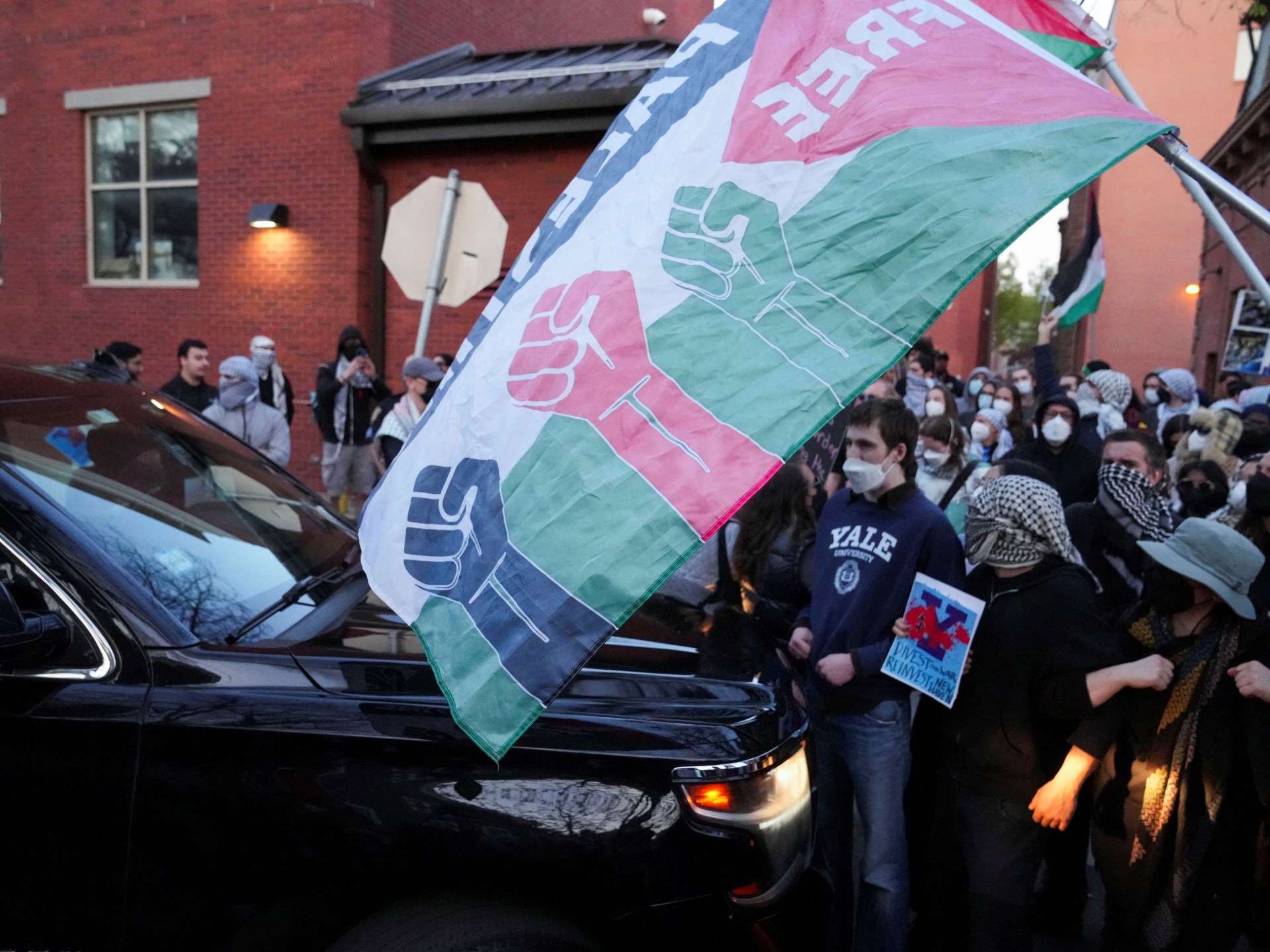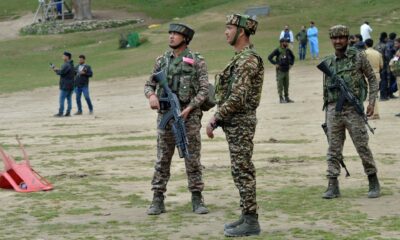Middle East
‘Deepest contradictions’: Yale bans pro-Palestine group amid Ben-Gvir visit | Gaza News

Yale University has become the latest top institution in the United States to ban a pro-Palestine group, this time for protests against a visit by far-right Israeli National Security Minister Itamar Ben-Gvir.
Ben-Gvir’s stop near the university in New Haven, Connecticut, on Wednesday sparked outrage as protesters criticised the minister’s support for surging attacks on Gaza, and most recently, his calls to bomb “food and aid depots” in the Palestinian territory.
Speaking to Al Jazeera, Raed Jarrar, the advocacy director at Democracy for the Arab World Now (DAWN), described the university’s silence about Ben-Gvir, who has “openly called for genocide”, and its subsequent crackdown on protesters “not just a moral contradiction – it’s a moral and legal failure”.
The demonstrations began on Tuesday night when protesters gathered on campus and began setting up tents at a short-lived encampment. While lasting just a few hours, the scene was similar to encampment protests that swept across US universities last year, often prompting crackdowns and policy changes from administrators.
The next day, Yale said in a statement that the encampment had violated its policies related to the use of outdoor spaces and students who had been warned or punished in previous incidents would face “immediate disciplinary action”.
It added that the university was investigating “concerns … about disturbing anti-Semitic conduct at the gathering” without providing any details.
The administration also said the student organisation Yalies4Palestine would lose its official status for sending “out calls over social media for others to join the event” and for later taking credit for the event.
In a statement to the student newspaper, the Yale Daily News, a group of pro-Palestine protesters denied the event was affiliated with or planned by any group.
The protests then continued on Wednesday night when Ben-Gvir arrived for a speech at the Shabtai, a private Jewish society that describes itself as “based at Yale University” although it is not formally affiliated with or located at a property owned by the university.
Ben-Gvir briefly taunted the protesters with what his office told CNN was a “victory sign” gesture as he was met with chants of “shame on you”, according to video of the event.
His office later said a water bottle had been thrown at him from the crowd, which included students and nonstudents, and he was unharmed.
‘Attacking students … won’t save Yale’
Yale’s latest punishment for pro-Palestine protesters comes during a wider pressure campaign on top universities by the administration of President Donald Trump.
While former President Joe Biden was seen as endorsing crackdowns on pro-Palestine protests, which he broadly described in April last year as “anti-Semitic”, the Trump administration has escalated the response.
Using claims of “anti-Semitism”, the Trump administration has sought to deport noncitizen pro-Palestine university protesters and has frozen or threatened to freeze federal funding for several top institutions, including Columbia University in New York and Harvard University in Massachusetts, if they do not agree to a series of policy changes.
Throughout the protest movement, organisers have repeatedly challenged the notion that such demonstrations are anti-Semitic, noting the regular involvement of Jewish students and disavowing rare instances of anti-Jewish statements made at often publicly open demonstrations.
In their statement carried by the student newspaper, pro-Palestine protesters at Yale accused administrators of coming down particularly harshly to avoid recourse from the Trump administration.
“Attacking students and alienating community members didn’t save Harvard or Columbia. It won’t save Yale,” they said.
Yale did not reply to Al Jazeera’s request for comment on whether concerns about a Trump administration response informed its disciplinary actions or if it had any response to Ben-Gvir’s visit.
For her part, Harmeet Dhillon, the assistant attorney general of the Department of Justice’s Civil Rights Division, responded to a video on X showing protesters refusing to break a human chain to allow a student to pass through their ranks on campus.
The post claimed: “Jewish students aren’t allowed to walk through Yale’s campus anymore!”
Dhillon wrote that her office is “tracking the concerning activities at Yale, and is in touch with affected students”.
While critics said heavy-handed responses to pro-Palestine protesters have become commonplace in the US, some observers said the dissonance on display at Yale has been particularly striking.
Ben-Gvir was convicted in 2008 by an Israeli court of inciting racism and supporting a “terrorist” organisation, the founded Kach group, which supported the annexation and ethnic cleansing of the Palestinian territories.
He has called for a no-holds-barred military operation in Gaza, where UN experts already say Israel is committing “genocidal acts”.
He has appealed for Israel to commit what would constitute war crimes under international law in Gaza. Most recently, he posted on X that he told “senior Republican officials” at Trump’s Mar-a-Lago estate in Florida that Israel should bomb “food and aid depots”.
‘Deepest contradiction’
Eman Abdelhadi, a sociologist at the University of Chicago, said Yale’s silence regarding Ben-Gvir speaking at an organisation that claims to be based at the university “exposes the deepest contradictions in our society and in these institutions that are supposed to be dedicated towards truth seeking and critical thought”.
“[Ben-Gvir] faces no red line,” she said. “But the people protesting can face severe consequences.”
“This is a moment where universities are fighting for their lives and trying to argue to the American public that they are worth saving in the face of Trump’s onslaught,” she said. “And yet they show no moral courage.”
Middle East
Why the Palestinian Authority’s Abbas is under pressure to pick a successor | PLO News

The Palestinian Liberation Organization (PLO), under pressure to appoint a second-in-command to its ageing leader, Mahmoud Abbas, created a vice president position after meeting with senior officials on April 24.
Abbas, who is also president of the Palestinian Authority (PA), promised during an emergency Arab summit in early March that the position would be created. Yet it remains unclear who will eventually fill the post.
The aim is to prevent a power struggle after Abbas vacates his post – a scenario that Israel could exploit to cause the collapse of the PA, fully annexe the occupied West Bank and ethnically cleanse Gaza, experts told Al Jazeera.
Yet Dianna Buttu, a former legal adviser to the PLO, believes creating a vice president post in the PA will not avert a power struggle once Abbas is gone – rather, it could exacerbate conflict.
“The more fragmented the PA becomes, the more it will create a power vacuum … and that vacuum will be filled by external actors and mainly by the Americans and Israelis,” she warned.
Legitimacy crisis
Abbas, 89, assumed control of the PLO and PA after Palestinian leader Yasser Arafat died in November 2004 and has ruled without a popular mandate since dissolving parliament in 2007.
His Fatah party dominates the PA and PLO. The long-defunct parliament has faded away, and critics have slammed Abbas for seeming to undermine attempts to hold elections that could revive it.
In the absence of parliament, the PLO controls the succession, a task Abbas has postponed, including by decreeing last year that Rawhi Fattouh, head of the Palestinian National Council, would become interim president if the position became vacant suddenly until elections are held.
“Abbas has put this off out of fear that if he brought anyone forward, then they would be a rival,” said Khaled Elgindy, a visiting scholar at Georgetown University’s Center for Contemporary Arab Studies.
The PA was created by the Oslo Peace Accords, signed by Arafat and Israeli Prime Minister Yitzhak Rabin in 1993 and 1995.
Tasked with governing the West Bank and Gaza until a Palestinian state was created alongside Israel, the PA lost credibility among Palestinians as Israel’s occupation became more violent and oppressive, and land grabs for Israeli settlements continued.
Since Oslo, the population of settlements, illegal under international law, built on Palestinian land has risen from about 200,000 to more than 750,000.
In 2007, a violent split with Hamas in Gaza constrained the PA’s authority to the parts of the occupied West Bank that it had some limited control over.

The PA did manage to become the de facto Palestinian representative on the international stage, replacing the PLO.
But at home, Abbas’s popularity slipped as people’s suffering increased and the PA continued its security coordination with Israel, which was outlined in the Oslo Accords.
The PA is also seen to have failed to protect Palestinians from Israeli troops and settlers while using its authority to crack down on civil activists and opponents.
This has resulted in a situation in which whoever he appoints, “Abbas’s handpicked successor probably won’t win people over”, Elgindy told Al Jazeera.
The name suggested most often is Abbas’s close confidant and secretary-general of the PLO Executive Committee, Hussein al-Sheikh.
Al-Sheikh also heads the PA’s General Authority for Civil Affairs, which issues the Israeli-approved permits that enable a few Palestinians to navigate the movement restrictions Israel has implemented in the occupied West Bank.
Human rights groups and the International Court of Justice – the highest legal body in the world – see Israel’s movement restrictions against Palestinians as apartheid.
Sheikh’s long-standing relationship with the Israeli authorities has led critics to accuse him of acting as a liaison for the occupation.
“Nobody likes him [among Palestinians],” said Omar Rahman, an expert on Israel-Palestine with the Middle East Council for Global Affairs. “[Al-Sheikh] is tainted by his relationship to Israel and perceptions [that he is embroiled in] massive corruption.”
External pressure
The pressure on Abbas regarding succession has ebbed and flowed over the years, intensifying over recent months as Arab states push him to appoint a successor to prevent the PA from dissolving into chaos, analysts told Al Jazeera.
Egypt is particularly eager to ensure succession, according to Rahman.
In March, Egypt called and hosted an Arab League summit, during which it unveiled its reconstruction plan for Gaza to counter United States President Donald Trump’s proposal to ethnically cleanse Gaza and turn it into a “Middle East Riviera”.
Egypt was mentioned as one of the countries where Palestinians could be “moved to”, an idea it firmly rejected and countered with its reconstruction plan.
The proposal included creating a Palestinian technocratic administration, supervised by the PA, to oversee the reconstruction of the devastated enclave without displacing anyone.

The path to PA administration of Gaza is not at all clear, however, as both Hamas and Israel object to it – Hamas because it administers Gaza currently, while Israel has panned the PA as ineffective.
Abbas appears to have gone on the offensive, delivering angry broadsides against Hamas during the meetings and blaming the group for allowing the continuation of Israel’s genocide in Gaza by not handing over captives and disarming.
However, many Arab states blame Abbas for failing to reconcile his Fatah faction with Hamas, making them eager to see a change of guard in the PA, according to Tahani Mustafa, an expert on Palestinian internal politics with the International Crisis Group
Since 2007, Fatah and Hamas have signed several agreements to heal their divisions after the fighting that split the Palestinian national movement.
“I think there has been a lot of frustration [among Arab states] that [Abbas] has been more of a spoiler and obstacle to trying to get a united Palestinian front, which has given Israel a pretext to continue doing what it has been doing in Gaza,” Mustafa told Al Jazeera.
Can a vice president revive the PA?
Instead of creating a new political post, Buttu believes Abbas should hold elections for Fatah, the PLO and the PA.
The last time voting was held was just before the conflict between Hamas and Fatah in 2006. Hamas won a huge majority in those legislative elections.
The choice to create a new vice president post, she fears, won’t solve the legitimacy crisis or power vacuum once Abbas is gone, given what she described as Abbas’s lack of political will to revive Palestinian institutions.
“In typical fashion, Abbas is doing the bare minimum to get [Arab states] off his back,” she told Al Jazeera.
Elections, she acknowledged, could prove technically difficult due to Israel’s devastating war and genocide in Gaza as well as its violence and movement restrictions in the West Bank.
However, she said Palestinians could still find ways to vote, perhaps through an online portal or process.
“Inside Fatah itself, there is a lot of pushback on this appointment of a vice president. They are all saying there should be elections instead,” Buttu told Al Jazeera.
“[Abbas] is putting a Band-Aid on a wound so open that it requires surgery,” she said.
Middle East
US to offer Saudi Arabia $100bn weapons deal as Trump visit planned: Report | Weapons News

The deal could be announced during US President Donald Trump’s planned trip to the Middle East next month.
The United States is poised to offer Saudi Arabia an arms package worth more than $100bn, the Reuters news agency reports, citing six sources familiar with the matter.
The deal is reportedly in the works in advance of a planned trip by US President Donald Trump to Saudi Arabia, Qatar and the United Arab Emirates next month, Reuters reported on Thursday.
Top defence contractors such as Lockheed Martin, RTX Corp, Boeing, Northrop Grumman and General Atomics are reported to be involved in the supply of advanced weapons systems, according to Reuters, and several executives from the companies are expected to join Trump’s delegation for the visit.
The sources cited by Reuters say the contractor could see Riyadh supplied with a range of weapons including C-130 transport aircraft, missiles and radar systems.
It is unlikely, however, that Saudi Arabia will gain access to Lockheed Martin’s F-35 fighter jet. Only a select number of countries can buy F-35s from the US, such as NATO allies, Japan, South Korea and Australia.

Trump’s predecessor, President Joe Biden, tried unsuccessfully to sign a new defence pact with Saudi Arabia with the broader aim of normalising relations with Israel. Biden’s pact also called for Riyadh to restrict Chinese investment and halt arms purchases from Beijing, but Reuters said it could not establish whether Trump’s proposed deal would call for similar restrictions.
Neither the White House nor Saudi officials immediately responded to the request for comment, but a US defence official told Reuters that “security cooperation remains an important component” of the US-Saudi relationship. None of the defence contractors named by Reuters replied to queries.
While the US has long supplied Saudi Arabia with weapons, sales dropped off in 2018 following the murder of Saudi journalist Jamal Khashoggi. In 2021, the US Congress banned the sale of offensive weapons to Saudi Arabia in the wake of the murder and Riyadh’s involvement in the war in Yemen.
The Biden administration began to soften its stance on Saudi Arabia in 2022 after Russia’s invasion of Ukraine impacted global oil supplies, and the ban on offensive weapons sales was lifted in 2024 as Saudi Arabia was seen as a key partner by the US in the post-war reconstruction of Gaza.
Middle East
Palestinian officials vote to create a vice presidency under Mahmoud Abbas | Palestinian Authority News

The expectation is that whoever holds the role would be the frontrunner to succeed President Mahmoud Abbas, 89.
The Palestine Liberation Organisation (PLO) has announced the creation of a vice presidency under 89-year-old leader Mahmoud Abbas, who has not specified a successor.
After a two-day meeting, the body’s central council voted on Thursday to create the role of vice chairman of the PLO Executive Committee. This position would also be referred to as the vice president of the State of Palestine, which the Palestinians hope will one day receive full international recognition.
The expectation is that whoever holds that role would be the frontrunner to succeed Abbas, though it’s unclear when or exactly how it would be filled. Abbas is to choose his vice president from among the other 15 members of the PLO’s executive committee.
The PLO is the internationally recognised representative of the Palestinian people and oversees the Western-backed Palestinian Authority (PA), which exercises limited autonomy in some areas of the Israeli-occupied West Bank. Abbas has led both entities for 20 years.
Hamas, which won the last national elections in 2006, is not in the PLO. Hamas seized control of Gaza from PA security forces in 2007, and reconciliation attempts between the rivals have repeatedly failed.
Polls in recent years have shown plummeting support for him and his Fatah party.
Western and Arab donor countries have demanded reforms in the PA for it to play a role in post-war Gaza. The authority is deeply unpopular and faces longstanding allegations of corruption and poor governance. Appointing an heir apparent could be aimed at appeasing his critics.
Hamas slammed Abbas on Thursday for comments he made a day earlier, where he described the group as “sons of dogs” and urged it to release Israeli captives and lay down arms.
“Abbas repeatedly and suspiciously lays the blame for the crimes of the occupation and its ongoing aggression on our people,” Senior Hamas official Basem Naim said.
Since Israel’s war on Gaza resumed on March 18, at least 1,928 people have been killed there, bringing the total death toll since the war erupted in October 2023 to at least 51,305, according to the Palestinian Ministry of Health.
Abbas has been seeking greater relevance and a role in post-war planning for the Gaza Strip after having been largely sidelined.
Talks on a new ceasefire appear to have made little progress, and a Hamas delegation is in Cairo for renewed negotiations with key Egyptian and Qatari mediators.
-
Europe2 days ago
How to visit Rome for Pope Francis’ funeral and conclave
-

 Conflict Zones2 days ago
Conflict Zones2 days agoManhunt under way in Kashmir after deadly attack on tourists | Conflict News
-

 Education2 days ago
Education2 days agoHarvard’s president says the school will ‘not compromise’ on its rights with the Trump admin
-

 Lifestyle2 days ago
Lifestyle2 days agoNFL draft suits give prospects another way to cash in on their fame, flash their style on red carpet
-

 Africa2 days ago
Africa2 days agoEmmanuel Macron starts two-day visit to Madagascar
-

 Middle East2 days ago
Middle East2 days ago‘I grabbed my cat and ran’: Istanbul panics as earthquake hits | Earthquakes News
-
Europe2 days ago
New Prince Louis photo released to mark 7th birthday
-

 Europe1 day ago
Europe1 day ago‘The Art of the Deal’ meets global reality




